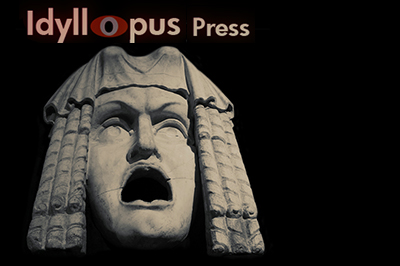
PART 1 - HAMLET, NORTH BY NORTHWEST, AND LOLITA
I like a game. Like this.
I'm watching (or was watching, when I began to write this) Tom Stoppard's 1990 Rosencrantz and Guildenstern Are Dead, which deals with the usual problems of reality, death, identity and consciousness and, really, "all the world's a stage". Hamlet. In case you don't recall the plot of Hamlet, or are unfamiliar with it, I'll try my best to give what's essential as we go along. After the death of his father, King Hamlet, Hamlet's mother, Gertrude, has too quickly married Claudius, King Hamlet's brother, who is now king. King Hamlet's ghost appears to the grief-stricken Prince Hamlet, having already appeared to others, which is how we know it's real and not Hamlet's imagination. Even as the ghost relates he's going to hell for his actions in this world, he discloses he was killed by Claudius and demands Hamlet avenge him. Though we know that the ghost is real, Horatio, a friend and counselor of Hamlet, has caused us to question whether Hamlet should listen to it, and no wonder. Hamlet's behavior now causes concern for all. The Prince at times gives the appearance of being mad. Does he feign insanity or is he actually mad? Enter Rosencrantz and Guildenstern, old school colleagues of Prince Hamlet's (it has been proposed they are based on cousins of the astronomer, Tycho, Brahe, who visited him in 1592, or are ancestors of his perhaps, there are different stories about this and it gets confusing). Claudius and Gertrude task Rosencrantz and Guildenstern to find out what's going on with the prince.
We reach the scene in which Hamlet both welcomes Rosencrantz and Guildenstern and confronts them with their conspiracy.
In the Shakespeare play:
HAMLET: Gentlemen, you are welcome to Elsinore. Your hands, come. Th' appurtenance of welcome is fashion and ceremony. Let me comply with you in the garb, lest my extent to the players (which, I tell you, must show fairly outward) should more appear like entertainment than yours. You are welcome. – But my uncle-father and aunt-mother are deceived.
GUILDENSTERN: In what, my dear lord?
HAMLET: I am but mad north-northwest. When the wind is southerly, I know a hawk from a hand saw.
People have argued the meaning of the last line. Is Hamlet saying that on some days he's mad and on others he knows the difference between a hawk and a hand saw? Or was the "hand saw" instead a bird, and Hamlet was mad when the wind was north-northwest, but when from the south he could distinguish between a hawk and a heronhaw (heronsaw) which is a wading bird as opposed to a bird of prey. In fact, if one digs into it one learns "handsaw" is a corruption from the Old French heronceau. There are multiple layers of meaning and misdirection and the acceptance of one interpretation does not mean having to rule out another. In a time when falconry was a royal sport, Hamlet could easily be speaking of two birds. The heronsaw doubling also as a hand saw could be a jocular absurdity. Nothing is ever quite as it seems in the play, just as everyone has to sort out whether Hamlet is mad or only pretending to be.
What seems most vitally important to me is Hamlet speaking of a hawk, a predator. Can Hamlet distinguish an enemy? Are Rosencrantz and Guildenstern his enemies?
When Rosencrantz and Guildenstern first meet with Hamlet he warmly welcomes them as good, old friends, though he confuses one with the other (so also did his mother appear to confuse one with the other). However, Hamlet wonders why they are here in this "prison". Becoming suspicious, he finally asks if it's a free visitation or were they sent for? After several attempts at denial, they confess it's not a free visitation. Stoppard afterwards has a scene in which Rosencrantz and Guildenstern play with determining whether there is wind or not and from what direction it comes, Stoppard emphasizing the significance of the I am but mad north-northwest. When the wind is southerly, I know a hawk from a hand saw line. There are film adaptations that put no focus on this at all.
The theater! Rosencrantz and Guildenstern have brought along a theater troupe, so they are in this way responsible for Hamlet staging a play within a play by which he hopes to determine Claudius' guilt. In the Stoppard play, ever hinting at fate and circularity, the theatrical director warns Rosencrantz and Guildenstern that he's been here before, tells them to concentrate on not losing their heads, and that he knows which way the wind is blowing.
Watching Rosencrantz and Guildenstern Are Dead, I recalled Hitchcock's 1959 North by Northwest and how there is debate as to whether or not the film's title referred to Hamlet. The official story, which I have found anemic, is that it was just a working title that referred to the direction of the movement in the movie, from New York to South Dakota. Which isn't exactly NNW as one would assess it on an aneometer but does mean traveling just slightly to the northwest rather than directly west.
Then I'm reminded of Kubrick's1962 Lolita and how I've been able to place them in South Dakota when they should be in New England on the way to the Enchanted Hunters hotel after Humbert picks Lolita up from camp, and how they are later found in the South Dakota Badlands rather than in the southwest. I've written of this, with documentation of where I am able to place them in South Dakota, at Piedmont, and later at Hill City (near Mt. Rushmore) and Scenic, with some rationalizations on the possible meaning of this. But a thing that hadn't occurred to me was there being a possible relationship to North by Northwest. Remember, James Mason was in both films. In North by Northwest, when Cary Grant flees New York on a train, James Mason both follows and guides his movements, seeking to kill him, the action eventually making way to Mason's spectacular house on the rim of Mount Rushmore. In Lolita, Mason takes the orphaned Sue Lyon and, hoping to hide his criminally abusive use of the child, flees with her from New England to the west, the pair shadowed by the peculiar chameleon-like character played by Peter Sellers. In Nabokov's novel, that character is initially feared, by Humbert, to be an uncle of his, the husband of his father's sister, who we may reason had been abusive, Humbert stating that uncle shares his proclivities, and thoughts of the uncle causing Humbert nausea. In the film, Peter Sellers is identified as being an "uncle" when he eventually makes off with Lolita.
Kubrick refers to Psycho in Lolita in the scene where Humbert prepares to shoot Charlotte in the bathroom only to find she's not there. Why not refer to North by Northwest as well? Kubrick has elsewhere referenced Hamlet in his films--why not Hamlet via Hitchcock?
The maddening northerly wind shows up again toward the end of Hamlet.
Ah, the problem of whittling down plot to a few sentences. Ophelia, who is in love with Hamlet, and who Hamlet torments with his madness, has a father named Polonius, and a brother named Laertes. After Hamlet has killed Polonius when he was hiding behind a drape, Hamlet having mistaken him for Claudius spying on a conversation he was having with his mother, Claudius sends Hamlet to England. Supposedly, this is to protect Hamlet from repercussions for his having killed Polonius, but by means of the play-within-a-play that Hamlet had staged, Claudius is aware Hamlet knows he killed his father. Rosencrantz and Guildenstern burdened by the King with escorting Hamlet to England, Claudius also gives them a letter they are to deliver to the King of England. During their journey, Hamlet discovers the letter is a request that the King immediately execute him. Hamlet rewrites the letter so that it instead demands the execution of Rosencrantz and Guildenstern.
Pirates happen, Hamlet escapes the ship and returns to Denmark. Horatio is a character that acts as a voice of reason and Hamlet relates to him the story of the death sentences for Rosencrantz and Guildenstern he's placed in their own hands, which they will unwittingly deliver the King of England. Assuming that Rosencrantz and Guildenstern have continued to England with the letter, sans Hamlet, it is only a matter of time before the news of their deaths reaches court and Claudius becomes aware that Hamlet knew the letter's content and changed it. In the meanwhile, we've got questions concerning Hamlet's actions. So does Horatio. What of Rosencrantz and Guildenstern and Hamlet sending them to their deaths. Was that really merited? Hamlet insists it was.
Osric, a courtier, then appears to invite Hamlet to a duel with Laertes, the son of Polonius and also the brother of the poor Ophelia who during Hamlet's absence herself went mad, due Hamlet's mistreatment of her, and died by suicide or accident. The proposed duel is one that has been plotted by Claudius, who has arranged that Laertes will have a poison-tipped foil. If Hamlet wins, Claudius has prepared poisoned congratulatory wine to give him. If Hamlet accepts the duel, whether he loses or wins, he will die.
OSRIC: Your lordship is right welcome back to Denmark.
HAMLET: I humbly thank you, sir. [To Horatio] Dost know this water-fly?
HORATIO: No, my good lord.
HAMLET: Thy state is the more gracious, for 'tis a vice to know him. He has much land, and fertile. Let a beast be lord of beasts, and his crib shall stand at the king's mess. 'Tis a chough, but, as I say, spacious in the possession of dirt.
OSRIC [his hat in his hand]: Sweet lord, if your lordship were at leisure, I should impart a thing to you from his majesty.
HAMLET: I will receive it, sir, with all diligence of spirit. Put your bonnet to his right use. 'Tis for the head.
OSRIC: I thank your lordship, 'tis very hot.
HAMLET: No, believe me, ’tis very cold. The wind is northerly.
OSRIC: It is indifferent cold, my lord, indeed.
HAMLET: But yet methinks it is very sultry and hot for my complexion.
There's a lot of word play linking this scene with the initial meeting between Hamlet, Rosencrantz and Guildenstern, and Hamlet's "I am but mad north-north-west: when the wind is southerly I know a hawk from a handsaw". Osric is even described as an insect, and, as I've stated, the handsaw is hazarded by some to be a heron (heronshaw), and a heron eats insects. Hamlet also describes Osric as a bird, a chough, said to be likely instead a jackdaw, characterized as vain, but also as a harbinger of death.
Hamlet had declared himself able to tell the difference between a heron and handsaw (heronshaw) when the wind comes from the south. He was able to ascertain that Rosencrantz and Guildenstern were there to spy on him, and he later found they were (unwittingly) escorting him to his death. Now, the wind is northerly, and Hamlet plays word games with Osric, not treating him very seriously. He seems unable to see that Osric, who he describes as the water-fly, which would be food for a heron, at the the bottom of that hawk-heronshaw-insect totem pole, is a messenger leading him to his own death, as suggested by the comparison to the jackdaw. Or he simply doesn't care.
Again, it is an odd scene for all that isn't said in it, what doesn't take place. Hamlet has told Horatio about arranging for the executions of Rosencrantz and Guildenstern even though they didn't know the letter they carried condemned Hamlet to death. Hamlet has philosophized so much on life, and though he doesn't mourn his friends, who he considers as having been both fated to death, as well as deserving it through their duplicity, had begun to wonder what was fair to Laertes. After all, he had killed Polonius, Laertes' innocent father, and could be blamed for Ophelia's madness, which caused her death. One senses that between Horatio and Hamlet there's a wealth of things to be said and that this is a conversation that is cut short by Osric's arrival. Rather than dismiss the courier, Hamlet gives himself over to a game of words, enjoying outwitting Osric, and then he abandons any sympathy for Laertes in his eagerness to accept the duel and prove he's the better man.
After the massacre that ensues, Osric and Horatio are the two left to receive the news that Rosencrantz and Guildenstern are dead, and the messengers who have carried the news from England complain that there is no king to thank them. With the avenging of King Hamlet's death, his house has been exterminated. Where is his ghost, which had demanded vengeance? Is it satisfied?
Was Prince Hamlet ultimately felled by his own vanity, or by a nihilistic pre-determinism that accepted every action as already fate-forged? Never mind a scene with a gravedigger that places Hamlet as being about thirty, there are three source texts for Hamlet and they differ on the matter of Hamlet's age, one placing him as being about sixteen. Despite his deep reflections which cause many to view him as wise, he's ultimately immature and vulnerable in the way a youth is as opposed to an adult. He's a veritable James Dean for his time. If not a rebel without a cause, for he certainly has reason, he remains a troubled, impetuous youth whose mind zigzags cleverly but also drags his emotional body along, Hamlet seeming never very concerned with what actions best befit a potential sovereign. To be or not to be? Should we look upon him as having been maddened by the north-northwest winds that came with Osric? Horatio, by Hamlet's design, remains to relate the puzzle.
But what has this to do with Cary Grant's Roger Thornhill, in North by Northwest, who is confused with the non-existent agent George Kaplan? Rosencrantz and Guildenstern are two yet behave as one and are treated as one, each confused with the other. However inconsequential they are treated in respect of their lesser status, their fates are undeniably threaded with Hamlet's, and there are correspondances between them. Thornhill's story is not equivalent to Hamlet, we are more concerned with associations that import foundational ideas.
Thornhill begins as an ad executive, a person of means and consequence, who as an ad executive doesn't mind throwing his weight around, manipulating others with the excuse that he's not lying but editing a situation to better advantage. He's a person of privilege, but when he appears to accidentally answer for George Kaplan, it no longer matters who he is, who he thinks he is, who he says he is, he has become the nothing that is George Kaplan who has been targeted to be murdered. To rectify a feeling of having gained weight, Thornhill's philosophy had been to "think thin", but his will no longer matters, one thing after another happening counter his plans and desires, as determined by superior powers. He becomes a fugitive from both foreign agents--most notably James Mason playing Vandamm--and U.S. "alphabet soup" agents, and meets a woman on a train who assists him.
THORNHILL: Think how lucky I am to have been seated here.
EVE: Luck had nothing to do with it.
THORNHILL: Fate?
EVE: I tipped the steward...
Thornhill chases the ghost of Kaplan all the way to a corn field in Indiana. Then participates in a play-within-a-play in which he appears to be killed by yet another person who is two-in-one, Eve, the woman he'd met on the train who turned out to not be just a woman, then turned out not to be just a lover/cohort of Vandamm's, but a double agent.
When they first meet, Eve queries Thornhill on the meaning of the trademark, ROT, on his match book. The O, supposedly representing his middle name, is designed to far outsize the R and the T. She asks what the "O" stands for. "Nothing," he replies.
Just for the hell of it, though entirely unnecessary, what is the etymology of ROT.
rot (v.) Middle English roten, from Old English rotian, of animal substances, "to decay, putrefy, undergo natural decomposition" (intransitive), also of vegetable matter," from Proto-Germanic *rutjan (source also of Old Saxon roton, Old Norse rotna, Old Frisian rotia, Middle Dutch roten, Dutch rotten, Old High German rozzen "to rot," German rößen "to steep flax"), from stem *rut-. Related: Rotted; rotting. By c. 1200 as "fester or decay morally, become morally corrupt." Transitive sense of "cause decomposition in" is from late 14c. To rot in prison (mid-14c.) suggests wasting disease.
Source: Etymonline
Though the "rozzen" of rot is not the same source as "rosen", there could be said to be as much similarity as a hand saw to a heronshaw, and that perhaps ROT points to Rosencrantz. What is the etymology of crantz?
...from Middle Dutch crans, from Middle High German kranz, from Old High German kranz, probably altered from krenz, ultimately related to Proto-Germanic *kringaz (“circle, ring”). The English spelling seems to have been influenced by cognate German Kranz.
Source: Wiktionary
This is no surprise as rosen-crantz means rose wreath, but with the "wreath" we may overlook the "nothing" that is zero.
My interest is in Hitchcock's use of elements from Hamlet, then Kubrick's use, referencing the Shakespeare also via Hitchcock. Whatever interest, right now, I have in Hamlet is wondering what they found so interesting as to be influenced by it and reference it.
Following are a few bits from North by Northwest that, taken as a whole, help with linking the film to Hamlet.
First some screengrabs from the New York section. In the beginning, Thornhill riding with his secretary in a cab, she goes over his schedule for the next day, which includes a lunch with a Falcon. I'm going to take this as a reference to Hamlet's hawk, which he can differentiate from a heronshaw when the wind is southerly. Immediately thereafter, Thornhill is mistaken for Kaplan, kidnapped, and taken to a mansion in Glen Cove to see a man named Townsend--which, incidentally, is an area to which Bill may seem headed in Eyes Wide Shut for the ritualized orgy. Thornhill, whose identity is confused, is as yet unaware that the man who has kidnapped him is not Townsend. Hamlet was meta-theater, made even more evidently so in Rosencrantz and Guildenstern are Dead. Hamlet believes everyone around him is acting, while his grief over his father's death is authentic, but he acts as well, feigning madness. In North by Northwest, the kidnappers believe Kaplan is acting when he insists he's Thornhill, and they themselves are putting on a play of being Townsend, his wife, and employees. When Thornhill protests to the kidnappers he has tickets to the theater that evening, Townsend, actually Vandamm, responds that Kaplan does a good job of making the room a theater. After the authentic Townsend is murdered, we learn that U.S. agents had created the character of George Kaplan, and decide not to interfere and help Thornhill in his troubles. We are shown a newspaper in which there is a headline concerning fire in the northwest, and Hamlet had said he was mad when the wind was north-northwest. Thornhill is now on the run, believed to be the murderer of Townsend, and is forced to act as if he is yet another person, not-Townsend, as well as not-Kaplan. He meets Eve on the train, and as she tells him she knows who is the man on the run, he behaves authentically, but Eve does not as she doesn't betray she is the girlfriend of the kidnapper, Vandamm, or that she is also an agent for the U.S. government. The fact that Eve would help a man she doesn't know, who media evidence gives as a murderer, should have alerted Thornhill something wasn't right, but the wind is north-northwest and he's unable to divine a hawk from a heron.
 | 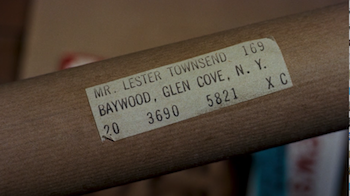 |
 | 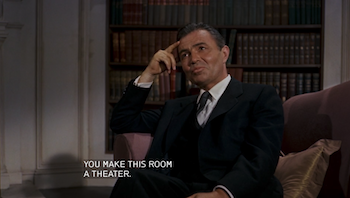 |
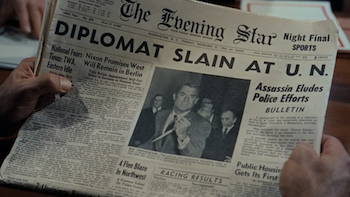 | |
In Chicago, after Thornhill escapes being murdered in the corn field, where a fiery blaze kills two when the crop duster slams into a truck (refer back to the news headline of the fiery blaze in the northwest), he finds Eve and confronts her with his realization that she is actually working with the kidnappers. He believes her emotional involvement with him was not authentic, which it initially wasn't. She, too, had been acting, and now juggles acting with the truth, for she does care for Thornhill and is pained he sees her only as the manipulative agent of Vandamm's. Pretending to take a shower, he whistles "Singing in the Rain", a song from a film in which a singer dubs for an actress, and Eve leaves for a prearranged meeting with Vandamm at an art auction. Thornhill follows and confronts her with the kidnappers at the auction. In order to escape Vandamm's thugs, he pretends a kind of madness, disrupting the bidding, knowing the police will be called and that he will be at least safe from Vandamm while in their custody. In the cop vehicle, a policeman states they are going north to the 42nd precinct, but then instead they are directed to the airport. Thornhill refers to himself as the "mad" killer. At the Northwest terminal the police hand over Thornill to The Professor, the lead U.S. agent who is leagues above their jurisdiction. Further cementing the connection with the north-northwest wind, as Thornhill and The Professor pass a plane they are buffeted with wind generated by it--the northwest wind of deception and madness, when a hawk and hand saw may be confused. The wind is so forceful we are briefly unable to hear what the two are discussing, though we do know The Professor is attempting to get Thornhill to help them. As the wind subsides, Thornhill compares himself to a fly when he accuses Eve of having used sex like a flyswatter, which is when he's informed she's one of their agents and he has put her life in danger as she has fallen for him and disrupted Vandamm's trust. Thornhill agrees to help them, led to believe that he and Eve can then go off together.
 | 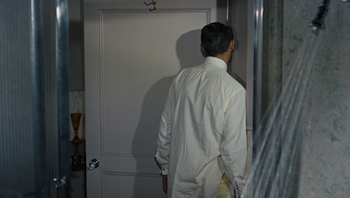 |
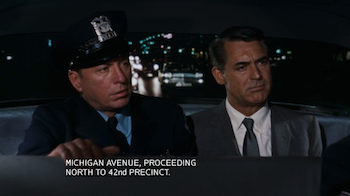 | 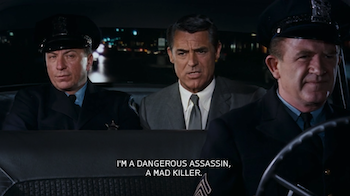 |
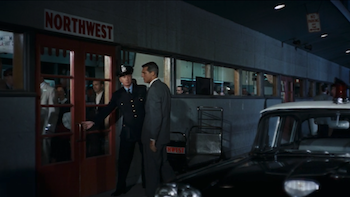 | 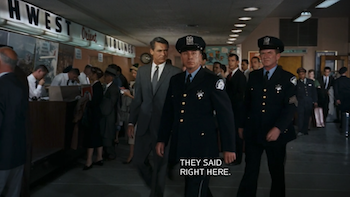 |
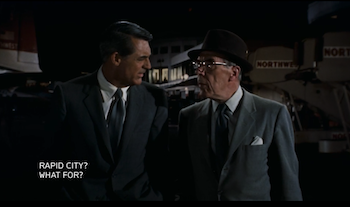 | 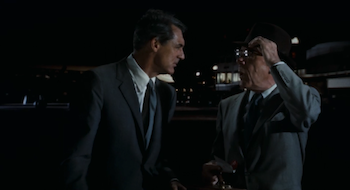 |
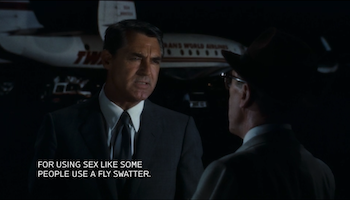 | |
At Mount Rushmore, Hitchcock makes a connection with Rosencrantz and Guildenstern via Teddy Roosevelt's head in the massive sculpture. Thornhill says Roosevelt is looking directly at him (which he's not) and The Professor states it's perhaps to caution him. The play-within-the-play takes place, Eve killing the character of George Kaplan and fleeing. Thornhill learns that The Professor has lied to him and that Eve, who does love him, is leaving with Vandamm that night. He goes to Vandamm's house, gains access, and learns that Eve is in danger. The play-within-the-play was found out and she is to be killed. He also discovers that a Meso-american ceramic that Vandamm purchased at the auction is full of valuable microfiche. How to warn Eve she's in danger? When he pulls out his handkerchief to wipe his hands, seeing his trademark on the cloth, Thornhill devises a plan. She knows his trademark from his matchbook, and so he tosses a matchbook of his into the room next to her, a message written inside that she is in danger and is to meet with him in her bedroom. (I suppose in Hitchcock's film this is vaguely equivalent to Hamlet being sent to England, finding out he is to be executed, rewriting the message, and authenticating it with the appropriate seal.) As yet unable to find an opportunity to escape, when Eve leaves for the plane with Vandamm, the agent-housekeeper sees Thornhill's reflection in the television set and realizes he's inside the house. Hitchcock precedes and follows the shot of Thronhill's reflection in the television screen with direct shots of Thornhill so we have an interesting reversal inserted. Thornhill escapes her when he realizes the gun she held on him is the play gun used in the play-within-the-play. He helps Eve escape Vandamm but they are cornered so they must climb down Mount Rushmore. The bad guys are defeated but Thornhill is left desperately holding Eve's hand as she dangles from Mount Rushmore in a literal cliff-hanger. Crossfade to Thornhill pulling Eve up into the upper berth of their train compartment, the pair now married and celebrating their honeymoon. Cut to the train entering a tunnel. The train's name? Southern. We are back to territory in which Hamlet can tell a Hawk from a hand saw/heronshaw. Eve and Thornhill have survived their brush with elite powers, foreign as well as American, that had no compunction against sacrificing them for their needs.
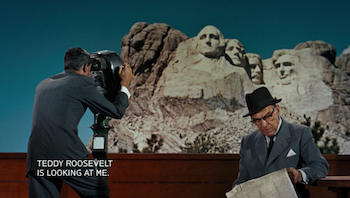 | 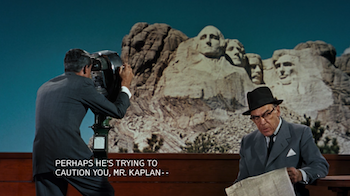 |
 | 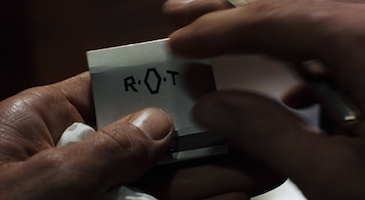 |
 | 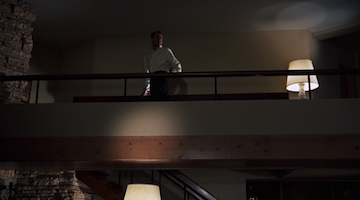 |
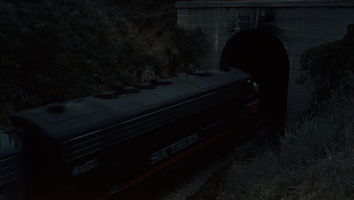 | |
Skipping back to the opening credits, after those that are over the reflection of traffic in a skyscraper's windows, Hitchcock moves to frenetic New York life. For his section, he opens with people flooding out of a building's doors, then has shots of people flowing through staircases and intersections, ending with Hitchcock making an appearance as a man too late for the bus. No, wait, the credits don't end on Hitchcock. They briefly continue, circulating back around to show again the initial shot of people flooding out a building's doors, the duplication popping out because on the left-center of the screen is a woman in a blue dress who dominates the shot. Then cut to elevator doors and Cary Grant emerging with his secretary, who happens to make a weirdly emphatic impression for what little screentime she has.
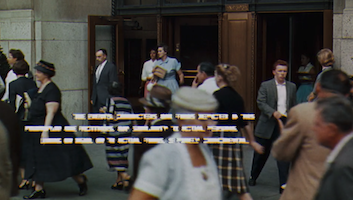 |  |
As Kubrick is a big one for circularity and he must have loved this. As Kubrick is a big one for screen reversals, he must have loved the imposition of the reverse shot of Thornhill in in the television screen as well.
Kubrick had previously referenced Hamlet in his films, but in Lolita he chooses to do so via Hitchcock's North by Northwest, or at least I believe he does, placing Humbert and Lolita near Mt. Rushmore though they should not be in the Black Hills, yet there they are and I love it. What a great game of hide-and-seek.
PART 2 - HAMLET, ROSENCRANTZ AND GUILDENSTERN ARE DEAD, AND EYES WIDE SHUT
I wouldn't have written this piece, had it not been for a little thing in the film Rosencrantz and Guildenstern are Dead". It concerns the music in the scene in which the pair are introduced to the king and queen and given their mission concerning Hamlet. Stick with him and find out what's up.
Jocelyn Peek's original score for "Backward Priests", released on her 1997 album "Deluge" is below.
The viola instrumentation that enters at about 27 seconds in the above is different from the strings in the "Backwards Priests" in Eyes Wide Shut" Compare to the strings that begin at 36 seconds below.
Completely different.
Now, compare the strings in "Backwards Priests" to the strings at 22:41 in Rosencrantz and Guildenstern Are Dead. The string line is almost exactly the same as the new string intro in the "Backwards Priests" used in Eyes Wide Shut, and the same voicing. It's repeated a couple of times with slight changes.
Yes, only a few notes shared, but they are resolutely identical in spirit. And so it is interesting to me that the initial instrumentation of the strings in "Backwards Priests" is not the same as was in the film. Instead, it's as we hear in Rosencrantz and Guildenstern Are Dead.. I've seen no mention of this in Pook's interviews--at least not any of the interviews I've come across.
If this isn't entirely coincidental, Kubrick is now directing us to Hamlet through Tom Stoppard's remarkable Rosencrantz and Guildenstern are Dead, which is a great piece of meta-theater. One of the more salient lines in the play relevant to Eyes Wide Shut is the theatrical director, as I've stated above, telling Rosencrantz and Guildenstern that he's been here before, warning them to concentrate on not losing their heads, and that he knows which way the wind is blowing. Ever hinting at fate and circularity.
As the music plays,Your visitation shall receive such thanks as fits a king’s remembrance, Queen Gertrude tells Rosencrantz and Guildenstern, confusing one with the other.
What has Hamlet to say about Rosencrantz and Guildenstern?
'Tis dangerous when the baser nature comes
Between the pass and fell incensèd points
Of mighty opposites.
Rosencrantz and Guildenstern are viewed as little people who have stepped outside their rank, between opposites, positioning themselves in a fight that is not their own, and yet they have done so at the invitation of the king and queen. This is not unlike Bill's problem with his being somewhere he shouldn't when he ventures into the masked party. He is in a place of far higher powers--only, and this is important, as I've pointed out in my analysis on Eyes Wide Shut, he is also explicitly there by invitation, and as he enters the masked ritual area he steps into a spotlight, as if it is reserved for him, and attention is immediately drawn to him though there would have been no time yet for his identity to have been disclosed to the masked man who nods in his direction (presumably Victor Ziegler). This is the otherworldly/underworld aspect that disturbs the logical world, the hero invited into a place that is specifically forbidden them. They are not ever to enter, and yet the point of the tale is that they must do so and face the consequences.
Bill's efforts to play detective and find out what has happened becomes his realizing he's not got the upper hand, that he is being followed. With rich people among his patients, Bill thought he was a big, successful doctor, and now must re-evaluate his place in the world. Though his journey is different from Roger Thornhill's, from Hamlet's, from that of Rosencrantz and Guildenstern, what links them all is he finds he's lost control, and that it bears the stamp of meta-theater throughout.
Kubrick connects back to North by Northwest by showing Bill heading in the direction of Glen Cove when he journeys to Somerton, the same area to which Thornhill was carried when he was kidnapped. Or this could be coincidence.
In respect of Hamlet, Kubrick throws in John Waterhouse's "Ophelia", positioned on a wall at Sharky's, where Bill takes refuge after realizing he's been followed, and opens the paper with the headline, "Lucky to be Alive". Inside the paper he finds the article on Amanda Curran's death.

Does Ophelia accidentally drown or commit suicide? Is Amanda Curran murdered or does she accidentally or intentionally overdose? "You are a very lucky girl, you know that. You're going to be okay this time, but you can't keep doing this," Bill had told Amanda when he saved her from overdosing at Victor's party. As he spoke with her, a great "pearl" ring on her hand would attract the viewer's attention, a sometimes so-called "poison ring" with a secret compartment. In Hamlet, Claudius had poisoned Hamlet's drink with a poisoned pearl, which Gertrude accidentally drinks instead. But in Eyes Wide Shut, one can look at Amanda as being the poison pill to Bill, the wall that arises in his marriage, he agreeing with Victor that he won't share with anyone what had happened there, thus lying to his wife later about his disappearance from the party.
Though much of the focus is on what happens to Bill, his own complicity with protecting Victor necessitates recognition, and how he is rewarded for it.
Your visitation shall receive such thanks as fits a king’s remembrance,
May 2023. Approx 4500 words or about 9 single-spaced pages.
Return to top of page
Return to Table of Contents for the Lolita analysis
Return to Table of Contents for the Eyes Wide Shut analysis
Link to the index page for all the analyses

